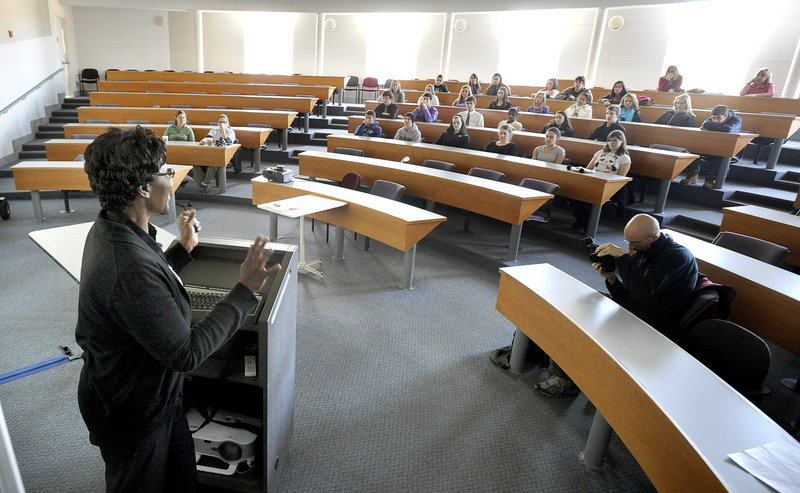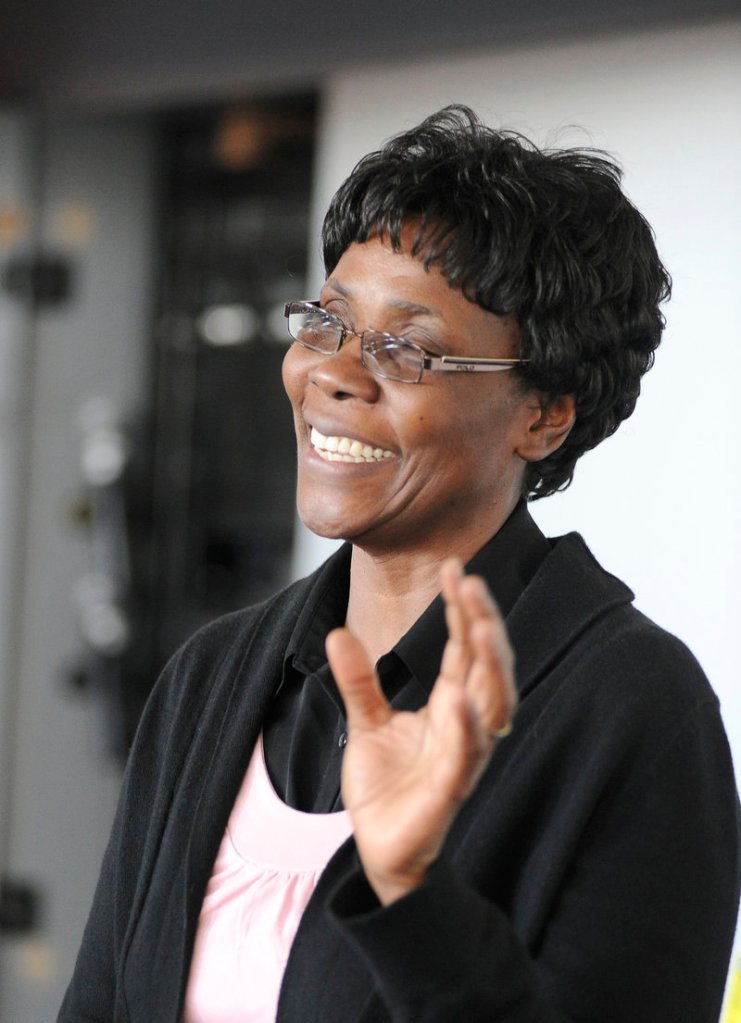BIDDEFORD — Helida Oyieke gave students from Biddeford High School a unique glimpse Tuesday of her work as a scientist in Kenya and the environmental challenges facing her East African country.
Oyieke is director of research and scientific affairs at the National Museums of Kenya and a part-time instructor at the University of Nairobi. This year, she’s also a Fulbright scholar and visiting professor at the University of New England.
Oyieke’s duties as a national museum director range far beyond cataloging and exhibiting fossils and folk art.
“We are studying the present and the past,” Oyieke explained. “We also advocate for the proper use and management of resources.”
Oyieke participated in the university’s ongoing effort to inspire Maine students to become scientists through a $2.9 million, five-year grant from the National Science Foundation.
In addition to meeting with Oyieke, two Biddeford High science classes toured the university’s science facilities and met with graduate students in the neurology, marine biology, athletic training and other science programs.
“It’s a chance for high school students to come to the university and experience science in a way that most of them haven’t before,” said Henrietta List, manager of the science foundation grant program. “It also allows them to identify with the type of university students they might become, so they begin to change their perception of what a scientist is.”
The high school students toured the university’s marine science lab, located where the Saco River meets Saco Bay, and reviewed the inner workings of a dissected brain, a subject made more relevant by Saturday’s shooting of Arizona congresswoman Gabrielle Giffords.
“This experience showed me the potential of how I’m going to learn in the future,” said Nancy Pham, a Biddeford High junior who plans to become a dental hygienist. “It also showed how college is different from high school, how it’s more serious and challenging.”
The foundation grant requires learning to be a two-way street for the graduate students involved in the outreach program, said Edward Bilsky, Ph.D., a professor of pharmacology and director of the Center for Excellence in Neurosciences.
“Working with younger students helps graduate students improve their communication abilities,” Bilsky said. “When you have to teach something, you really learn it, and research increasingly demands a team-based approach that requires scientists to be able to describe their work to colleagues and others.”
Learning is a two-way street for Oyieke, too. In addition to sharing her expertise in marine botany, Oyieke gave the high school students a global view of environmental challenges facing her nation.
Kenya is dealing with coastal pollution caused by human waste, erosion and development, she said, as well as more frequent droughts, unpredictable rains and increasing regions of malaria attributed to climate change.
Oyieke noted that most of the visiting Biddeford High students were girls. In Kenya, only about one-third of all girls go to high school because parents must pay for it, she said.
Oyieke said she plans to use her experience in the United States to improve education in Kenya and increase the number of girls that graduate from high school and go on to college.
“It’s about you learning from me and me learning from you,” Oyieke explained after her presentation.
Staff Writer Kelley Bouchard can be contacted at 791-6328 or at: kbouchard@pressherald.com
Send questions/comments to the editors.




Success. Please wait for the page to reload. If the page does not reload within 5 seconds, please refresh the page.
Enter your email and password to access comments.
Hi, to comment on stories you must . This profile is in addition to your subscription and website login.
Already have a commenting profile? .
Invalid username/password.
Please check your email to confirm and complete your registration.
Only subscribers are eligible to post comments. Please subscribe or login first for digital access. Here’s why.
Use the form below to reset your password. When you've submitted your account email, we will send an email with a reset code.